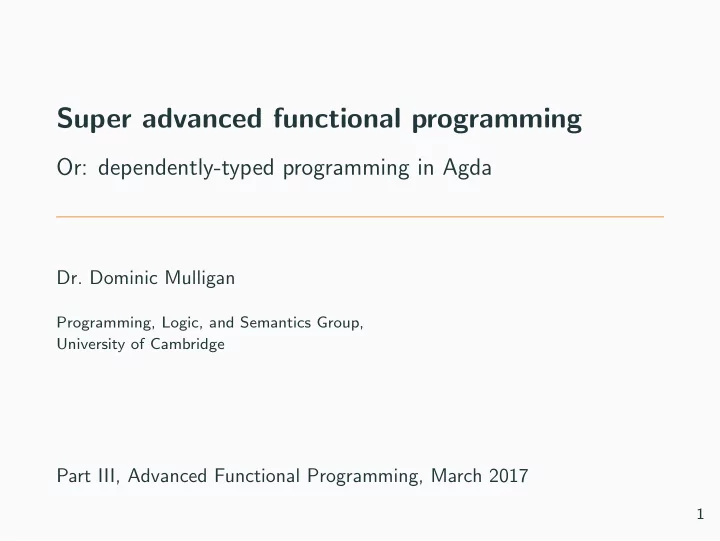

Super advanced functional programming Or: dependently-typed programming in Agda Dr. Dominic Mulligan Programming, Logic, and Semantics Group, University of Cambridge Part III, Advanced Functional Programming, March 2017 1
System F ω Very expressive type theory: • Used as a compiler intermediate language (e.g. GHC) • Can embed almost all useful (co)datatypes within it • Can express common programming abstractions with higher-kinds 2
System F ω Very expressive type theory: • Used as a compiler intermediate language (e.g. GHC) • Can embed almost all useful (co)datatypes within it • Can express common programming abstractions with higher-kinds But : • The monadic abstraction has associated laws • Must be checked by hand, on pen-and-paper 2
Internalising reasoning about programs How can we internalise this checking of laws? 3
Internalising reasoning about programs How can we internalise this checking of laws? Requires an embedded higher-order logic Requires types that depend on terms: ∀ x : N . x + 0 = x is a type, and its inhabitants are proofs 3
Internalising reasoning about programs How can we internalise this checking of laws? Requires an embedded higher-order logic Requires types that depend on terms: ∀ x : N . x + 0 = x is a type, and its inhabitants are proofs Moved from left plane to right plane of λ -cube 3
What’s the advantage? Agda can be seen as both a programming language and a proof checker 4
What’s the advantage? Agda can be seen as both a programming language and a proof checker Agda: • Allows us to encode very powerful invariants in types that guarantee program correctness • Acts as a foundation for mathematics, based not on sets, but on functions and types 4
Rest of this lecture: an interactive introduction to Agda... 5
Recommend
More recommend